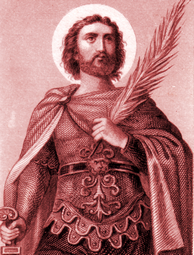Lives of the Saints
Our Models and Protectors
Spiritual Bouquet:
July 21

Saint Victor of Marseille
Soldier and Martyr
(† 290)
The Emperor Maximian, reeking with the blood of the Theban legion and that of many other martyrs, arrived in person in the year 290 at Marseilles, where the Church flourished. The tyrant was breathing nothing but slaughter and fury, and his coming filled the Christians with fear and alarm. In the general consternation, Victor, a Christian officer in the emperor's troops, went about in the nighttime from house to house, visiting the faithful and inspiring them with contempt for temporal death and love of eternal life.
He was arrested during these charitable offices and brought before the tribunal of the prefects Asterius and Eutychius, who exhorted him not to lose the fruit of his imperial service and the favor of his prince for the worship of a dead man. He answered that he renounced temporal rewards, if he could not enjoy them without being unfaithful to Jesus Christ, the eternal Son of God, who had vouchsafed to become man for our salvation, and who after dying raised Himself from the dead, to reign perpetually with the Father, being God equally with Him. The entire court received this witness with shouts of rage; and Victor was bound hand and foot and dragged through the streets of the city, exposed to the blows and insults of the populace.
He was brought back bruised and bloody to the tribunal of the prefects, who, thinking his resolution must have been weakened by his sufferings, pressed him again to adore their gods. However, the martyr, filled with the Holy Spirit, expressed his respect for the emperor but his contempt for the debauched gods. Saint Victor was hoisted on the rack and tortured a long time, until the tormentors grew weary and the prefect ordered him to be taken down and thrown into a dark dungeon. At midnight God visited him by His Angels. The prison was filled with a light brighter than that of the sun, and the martyr sang with Angels the praises of God. Three soldiers who guarded the prison, seeing this light, cast themselves at the martyr's feet, asked his pardon, and expressed their desire for baptism. Victor instructed them as well as time would permit, and sent for a priest the same night. The five of them went to the seashore, and the three converts were baptized, then all returned to the prison.
The next morning, when Maximian was informed of the conversion of the guards, in a transport of rage he sent officers to bring all four confessors before him. The three soldiers persevered in the confession of Jesus Christ, and by the emperor's orders were beheaded. Victor, set before almost the entire city for a final questioning, after having been exposed to its insults, was again placed on the rack, scourged, and carried back to prison, where he remained for three more days, recommending to God his martyrdom with many tears. After that term the emperor called him before his tribunal, and commanded the martyr to offer incense to a statue of Jupiter. Victor went up to the profane altar, and with a kick of his foot overthrew it. The emperor ordered his foot to be chopped off. The Saint suffered this mutilation with great joy, offering to God these first-fruits of his body. His barbaric tormentor condemned him to be put under the grindstone of a hand-mill and crushed to death. The executioners turned the wheel, and when part of his body was bruised and crushed, the mill broke down. The Saint still breathed a little; an order was given to behead him at once. His body with those of the other three heroes of Christ, Alexander, Felician and Longinus, were thrown into the sea, but cast ashore on the opposite bank by a current. They were buried by the Christians in a grotto hewn out of the rock. Very great miracles were wrought at Saint Victor's tomb or by his intercession, including the resurrection of a girl in her coffin, which occurred beside her open grave.
Les Petits Bollandistes: Vies des Saints, by Msgr. Paul Guérin (Bloud et Barral: Paris, 1882), Vol. 8; Little Pictorial Lives of the Saints, a compilation based on Butler's Lives of the Saints, and other sources by John Gilmary Shea (Benziger Brothers: New York, 1894).